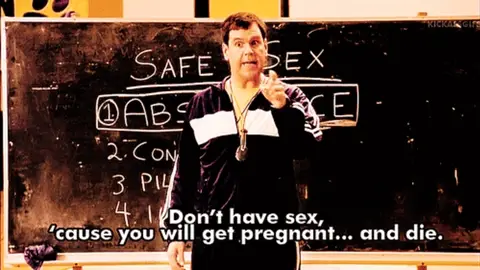Sex Education Needs To Teach Us What Good Sex For Women Means

If the last year has taught us anything, it’s that we need to be having some serious conversations about consent. But it goes even deeper and with uncomfortably relatable stories like Cat Person hitting an uncomfortable note with so many women, it’s also time to face the fact that a lot of people have some pretty major misunderstandings about what good sex actually looks like.
With no consistent sex education on the syllabus in schools and those awkward birds and the bees chats left mostly up to parents to deliver, it’s easy to see how so many of us are growing up with weird and often extremely toxic attitudes and understandings of what both healthy sexual and romantic relationships looklike.
You might know you want to have sex, have learnt what to do if you have an STI and even how to put a condom on a banana in less than 10 seconds flat, but the inherent sexism and basic AF nature of SRE as it stands means that we often gloss over what’s sort of the point of it: enjoyment – and how to make that happen for both you and your partner, no matter your gender or sexuality.
'Here's Courtney Act with a few pointers on WTF sexual consent actually is...'
And if we’re not talking more openly about things like mutual pleasure – that is the fundamental point of sex if we’re not doing it purely for procreation, which, let's face it, most of us are not- then how are we ever going to be able to know what a safe relationship really looks like compared to an abusive and manipulative one, for example?
It’s these fundamentals that inform our bigger cultural values around sex, so here are a few things we wish our sex ed had taught us about what sex a healthy sex life really should be like.
Good sex should be…
While teaching the importance of consent in every single sexual situation is paramount, it’s not enough on its own. We also need to think about what amounts to good sex; so perhaps it makes sense to say that should be sex that is fun, consenting and enjoyable for all involved.
Whether you’re having casual sex or are in a relationship, good sex is sex that you don’t feel pressured into or feel uncomfortable with. It’s sex that doesn’t hurt, isn’t scary and doesn’t ever make you feel like you have to pretend you like it when you don’t.
It’s the understanding that there’s a difference between liking someone and liking the sex you’re having. Sex isn’t a thank you or a compromise: it’s something you should do because you actively want to do it. You shouldn’t only expect mutual pleasure, you should be able and wanting to ask for it.
Bad sexIS sexist
Systemic sexism affects us in so many ways and while open and flagrant misogyny is clearly no good to any of us, there’s also something important to be said about benevolent sexism - that is the basic belief that we women are lovely, pretty, vulnerable creatures who need big strong men to protect us from both the world and ourselves.
It’s this form of insidious, almost unconscious sexism that creeps up on us from all areas of our lives and stops us being able to ask for what we want. It makes us out to be sexual objects and in heterosexual relationships can make us feel like we only exist for the pleasure of men.
Unsurprisingly this is doing our sex lives absolutely no favours and a recent study by psychologists at the University of Queensland found that women in heterosexual relationships who internalise sexist beliefs tend to have fewer orgasms because they are more likely to be accepting of selfish lovers.
We all – that is both men and women – are playing on these sexist expectations when we have sex with each other. It’s no good for men either as this type of sexist belief makes us assume men are naturally selfish during sex, which researchers in turn found means you are way less likely to ever attempt to ask for pleasure from them.
But sex should be active and not passive – don’t accept selfish behaviour as fact and don’t be afraid to look out for yourself and your own orgasm.
You should always feel able to say what you do and don’t like
While consent is and should be seen as a black and white concept, it’s essays like 'Cat Person' resonating so widely with women in particularthat illustrates that there’s also a large grey area that we aren’t talking about. This amounts to the things that happen when you’re having sex where perhaps you outwardly say yes or go along with even though in your heart of hearts you don’t feel totally comfortable with what you’re doing or what is being asked of you.
Maybe you say yes because you feel like you would be letting your partner down, you’re worried you’ll offend them, because there are certain expectations, because they’ve said they know you’ll enjoy it – the list goes on.
And if the reaction is anything to go by, a lot of us seem to have been there, but it’s worth really asking yourself the question of whether it’s fair for you to ever have felt that pressure.
The point is, if you don’t want to do something or you aren’t sure, you shouldn’t do it. Yes, your partner’s ego might take a hit and maybe it will kill the mood and bring whatever is happening to an end, but you know what? Realistically anyone worth being with isn’t going to want you to do something you aren’t comfortable with and there is so much value in being in the type of sexual relationship where you and your partner(s) can all be open and honest about what you do and don’t like, what you are and aren’t comfortable with.
Not everyone likes everything and different things turn us on and off, and you shouldn’t feel like you can’t be honest about that.
Surprise! The female orgasm isn’t actually that elusive
For some reason sex ed often glosses over the fact that the most enjoyable part of sex is having an orgasm. Culturally there’s a lot of chat about guys ejaculating (aka experiencing orgasm), but what about those of us with a clitoris? Yes it can be harder for women to orgasm purely through penetrative sex alone, but that is just one kind of sex and doesn’t mean that it doesn’t happen or that there aren’t things that you can both do to help make it happen either.
Good sex is about mutual pleasure so if you have a clitoris or your partner does, that means doing what your can to help them reach orgasm.
You shouldn’t feel like you have to fake an orgasm either - by faking and pretending you’re having a good time, you are essentially subverting your value to theirs. You are behaving as though you don’t deserve to get the same amount of pleasure, which is pretty illogical when you think about it
Remember that sex shouldn’t be painful
According to an NHS survey from 2017, 1 in 13 women experience pain during sex but a large portion of us feel too embarrassed to seek help and advice about it. This sucks because we shouldn’t ever have to feel ashamed about our bodies – especially when it comes to doing something that is totally natural and supposed to be fun. But that’s what we have to thank for a cultural history of shaming women for being sexual beings.
The most important thing, though, is that sex shouldn’t be painful, no matter how many stories about losing your virginity you’ve heard from dusty library books (ok, old copies of Cosmo). It might be uncomfortable at first but it shouldn’t hurt.
If you have a vagina and do experience pain during sex then maybe you it could be worth trying some lube to help things along. Equally, anxiety around sex can cause a condition that causes involuntary tightening of the vaginal muscles, which of course then hurts when penetration is attempted. If this sounds familiar then go and talk to your doctor! They can help and support you through working out why you might be experiencing this.
We need to be better at remembering allsexualitiesand gender identities
It might be 2018 but we are still failing to educate ourselves about sex and relationships in a way that isn’t biased towards the expectation that sex is something that relates to heterosexual relationships alone.
Newsflash: to be a woman you don’t have to have a vagina and sex as a concept is not just penis in vagina sex – it’s oral, anal, PiV, solo or however you want to define it' for you'.
And while society is doing better at understandingLGBTQ+ identities, we still have a long way to go before we even get to a place where it’s just people who identify as something other than straight and cis have to ‘come out’ to the people in their lives to express their true self.
It feels like a lot of the sexism we encounter in sexual situations is rooted in our cultural tradition of gender roles, which is why a lot of this piece relates to he/she relationships. They are perhaps the most visible examples of where this sexism exists, but LGBTQ+ relationships aren’t immune from the effects of gender roles either.
While assigned gender roles thrust upon us are feeling more and more obsolete, until we can unpick the sexism of these expectations as a basic level, they will go on to affect us all – whether you’re in a relationship that’s gay, straight, lesbian, poly or any other.
Don’t believe what you see on TV
Because culturally talking about sex is still something of a taboo, the way it’s presented in the media and especially on TV and in film should not be taken as a good illustration of what sex is really like or what it should really be like.
These industries are still dominated by men (hiiii systemic sexism, we hadn’t missed you but here you are again), which means often portrayals of sex are also both mainly heterocentric and observed from the male gaze, so not created to be consumed by women, non-binary people or anyone who identifies as LGBTQ+.
This is mirrored in porn, which often sees women in particular in both same sex and heterosexual situations portrayed as sexual objects, only really there to please straight men, which is absolutely not what mutual sex should be about. Porn that depicts violence towards women is also increasingly common and as such is affecting expectations of women in normal sexual relationships. Experimenting is fine is everyone is 100% up for it, but violence that isn’t asked for or consented to is never ever ok.
Remember Sex with different people is going to be different. Duh.
Oh so your ex liked that? Soz but that absolutely doesn’t mean that your new partner will, so if you are having sex then it’s important to keep communicating not only for consent but because by asking what they like and telling them what you do (and perhaps don’t) like, you’re only going to get to a place where you’re having better sex faster.
Talk to your friends about your sex life
Sex is totally natural yet for some reason, our culture has made it so that we feel secretive and embarrassed to talk openly and honestly about it. This not only means we are all way less educated about what healthy, realistic romantic and sexual relationships look like, but that it’s easy to feel pressured to engage in or react to sexual encounters in certain ways.
The only way we’re going to de-stigmatise this culture of shame that exists around women wanting to experience sexual pleasure is by being better at talking about it. And by talking to your friends about your sex life you will not only help process and question certain attitudes and experiences relating to sex,but you can shift the focus of sex from something that’s dirty to something that’s empowering.





